|
|
|
Sort Order |
|
|
|
Items / Page
|
|
|
|
|
|
|
| Srl | Item |
| 1 |
ID:
141100
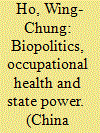

|
|
|
|
|
| Summary/Abstract |
This article endeavours to address the experience of Chinese workers with occupational disease as an instantiation of Agamben's notion of homo sacer – the ultimate biopolitical subject whose life is located outside the “normal” political, economic and cultural practices and, hence, is rendered largely silent and unintelligible in the public realm. It argues that the victimization of the occupationally sick worker has become almost a blind spot at the centre of governmentality insofar as the specific set of social regulations and power relations has created a “double ambivalence” among the victims who are constantly and disturbingly caught in between the public and private, the productive and unproductive, and the culturally normative and the culturally deviant. Such experiences of marginality contribute to the understanding of the biopolitical nature of contemporary Chinese state power, which adopts extensive “stability maintenance” (weiwen) measures to reduce resisters to a state of “bare life” susceptible to the rule of exception.
|
|
|
|
|
|
|
|
|
|
|
|
|
|
|
|
| 2 |
ID:
141094


|
|
|
|
|
| Summary/Abstract |
Debates about whether China's rise poses a threat or an opportunity for Taiwan have settled into a realist assumption that Beijing will continue to upset the balance of power and a liberal approach that believes the benefits of economic interdependence are leading to greater gains. Missing from this debate is a nuanced consideration of how Taiwan's policy elites view themselves and their position in cross-Strait relations. Taiwan's decision makers' views are deeply affected by, and interact with, factors and institutions on and beyond the island. This article offers a model of political processes – the staying power of the status quo and order of movement – as a possible route towards an explanation for Taiwan's position on cross-Strait negotiations. The conclusion is that the status quo position – de facto but not de jure independence – is becoming more entrenched with time. Taiwan's colours of partisanship, Blue and Green, are blending into Aquamarine.
|
|
|
|
|
|
|
|
|
|
|
|
|
|
|
|
| 3 |
ID:
141095
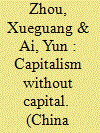

|
|
|
|
|
| Summary/Abstract |
Situated in an agricultural township in northern China, this study examines the rise of produce markets in rural China in the face of a chronic shortage of financial capital. Drawing on theoretical ideas in economic sociology, we explicate the mechanisms of gift exchange and credit taking and the conditions under which these mechanisms are used to mobilize financial capital and to facilitate market transactions in the absence of financial capital. We illustrate these issues and ideas using our fieldwork research on different produce markets and entrepreneurial activities.
|
|
|
|
|
|
|
|
|
|
|
|
|
|
|
|
| 4 |
ID:
141093


|
|
|
|
|
| Summary/Abstract |
In recent years, the Chinese central state has launched the “new socialist countryside” campaign (NSCC), which authorizes the local state expropriation of rural land from farmers, and then incorporates evicted farmers into township residence and urban citizenship. In affected regions, this campaign enables local state officials to enact practices of bureaucratic absorption that undermine potential resistance by bringing resisters into formal channels of bargaining through both juridical and ideological means. Based on ethnographic data from Sichuan province, this article reveals an in situ process of bureaucratic absorption in “Lan-ding village,” where the incorporation of rural residents into urban citizenship enables the depoliticization of resistance to land expropriation, first by changing the citizenship-based grounds on which legitimate claims to land can be made, then by discursively reframing eviction as a normative shift towards modern wage dependence.
|
|
|
|
|
|
|
|
|
|
|
|
|
|
|
|
| 5 |
ID:
141097
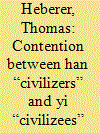

|
|
|
|
|
| Summary/Abstract |
During field research on environmental governance in the Liangshan Yi Autonomous Prefecture in 2012, the author studied the Chinese state's efforts to promote its agenda and “civilizing mission,” the resistance of local Yi people to both, and the resulting clash of discourses on environmental protection. To understand the nature and mechanisms involved in this conflict, the author focuses on the state's “civilizing mission” in light of Foucault's power concept. The article examines two issues: 1) the strategies by which the central state exerts power and asserts its policies in a minority area, i.e. how it attempts to steer the behaviour of local cadres in order to implement its modernization concept, and 2) whether and to what degree it makes a difference that the researched area is a “minority” (Yi) area. To answer these questions, one county in the prefecture was taken as a case study. Furthermore, this article continuously refers to the policy field of environmental governance to substantiate the thesis of a civilizing project conducted by the centre.
|
|
|
|
|
|
|
|
|
|
|
|
|
|
|
|
| 6 |
ID:
141091
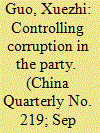

|
|
|
|
|
| Summary/Abstract |
This article investigates a prominent but little discussed CCP central organ, the Central Discipline Inspection Commission (CDIC), and its local discipline inspection commissions (DICs) in the post-Mao era. It analyses how the CCP exerts its control over the disciplinary organizations and argues that the disciplinary agencies' lack of autonomy hinders their efforts to crack down on corruption. This article investigates the important role played by the CDIC in CCP politics by examining its organizational structure, modes of operation and criteria for imposing disciplinary sanctions, and evaluates the measures and approaches employed by the Party's disciplinary organizations to combat corruption. The study concludes that structural, institutional and cultural factors hinder the effectiveness of the CCP's disciplinary agencies in their efforts to control Party members, officials and corruption.
|
|
|
|
|
|
|
|
|
|
|
|
|
|
|
|
| 7 |
ID:
141092


|
|
|
|
|
| Summary/Abstract |
How does the Chinese Communist Party (CCP) secure the loyalty of its coercive leaders, and its public security chiefs in particular, in the face of numerous domestic protests every year? This article presents the first quantitative analysis of contemporary China's coercive leaders using an original data set of provincial public security chiefs and public security funding during the reform era. I demonstrate that the CCP, owing to its concern for regime stability, has empowered the public security chiefs by incorporating them into the leadership team. Empowered public security chiefs then have stronger bargaining power over budgetary issues. I rely on fieldwork, qualitative interviews and an analysis of Party documents to complement my statistical analysis. The findings of this analysis shed light on the understanding of regime durability, contentious politics and the bureaucracy in China.
|
|
|
|
|
|
|
|
|
|
|
|
|
|
|
|
| 8 |
ID:
141101
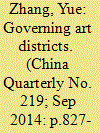

|
|
|
|
|
| Summary/Abstract |
Contemporary Chinese artists have long been marginalized in China as their ideas conflict with the mainstream political ideology. In Beijing, artists often live on the fringe of society in “artist villages,” where they almost always face the threat of being displaced owing to political decisions or urban renewal. However, in the past decade, the Chinese government began to foster the growth of contemporary Chinese arts and designated underground artist villages as art districts. This article explores the profound change in the political decisions about the art community. It argues that, despite the pluralization of Chinese society and the inroads of globalization, the government maintains control over the art community through a series of innovative mechanisms. These mechanisms create a globalization firewall, which facilitates the Chinese state in global image-building and simultaneously mitigates the impact of global forces on domestic governance. The article illuminates how the authoritarian state has adopted more sophisticated methods of governance in response to the challenges of a more sophisticated society.
|
|
|
|
|
|
|
|
|
|
|
|
|
|
|
|
| 9 |
ID:
141096
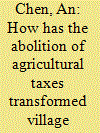

|
|
|
|
|
| Summary/Abstract |
The abolition of agricultural taxes (AAT) (2005–2006) significantly changed the workload, finance, authority and functions of village governments. In agricultural regions, village cadres had their agendas reset, with the top priority switching to the search for new revenues through “attracting investment” (zhaoshang yinzi). This new agenda fits perfectly with the demands of township governments. Facing an even worse fiscal crisis, township governments attempted to cover up their deficits using village revenues. The shared stake in increasing revenue has resulted in the convergence of the functions of township and village authorities. However, the change in the function of village governments has increased the disengagement between cadres and villagers.
|
|
|
|
|
|
|
|
|
|
|
|
|
|
|
|
| 10 |
ID:
141098
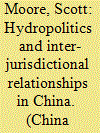

|
|
|
|
|
| Summary/Abstract |
Inter-jurisdictional water resource issues constitute a growing political and economic challenge in China. This article examines three such cases of hydropolitics, namely large dam construction, water resource allocation, and downstream water pollution, through the lens of central–local relations. It argues that the hydropolitics in China are characterized by the pursuit of localized preferences within the constraints imposed by a centralized political system. In each case, the primary actors are sub-national administrative units, who adopt various competitive strategies to pursue their own localized interests at the expense of neighbouring jurisdictions. This article argues that although vertical control mechanisms in the Chinese system effectively limit central–local preference divergence, they do little to contain horizontal conflicts between sub-national administrative units. The paucity of formal inter-jurisdictional dispute resolution mechanisms is a major barrier to meeting water resource challenges, and inter-jurisdictional collective action problems are likely to pose growing difficulties for the Chinese political system.
|
|
|
|
|
|
|
|
|
|
|
|
|
|
|
|
| 11 |
ID:
141099
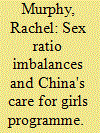

|
|
|
|
|
| Summary/Abstract |
In China, owing to many parents' preference for sons, the sex ratio at birth (SRB) is imbalanced. During the 2000s, SRB fluctuated at around 120 boys to 100 girls. In the early 2000s, to tackle the SRB imbalance, the Chinese government launched a series of policy measures under the banner of “care for girls.” This article presents a case study of the Care for Girls programme in order to explore how the construction of SRB as a social problem has led to the formulation and adoption of one set of policy responses to the exclusion of others. The analysis shows that the imbalanced SRB has been attributed to rural peoples' cultural and economic deficiencies rather than cast in terms of a need to recognize the inherent worth of girls or a need to ensure that all rural families have entitlements to basic social welfare. This construction of SRB has enabled the Party-state to advance a “care as control” policy response which comprises ideological education, conditional material benefits and sanctions, and which sidesteps the institutional underpinnings of the problem.
|
|
|
|
|
|
|
|
|
|
|
|
|
|
|
|
|
|
|
|
|